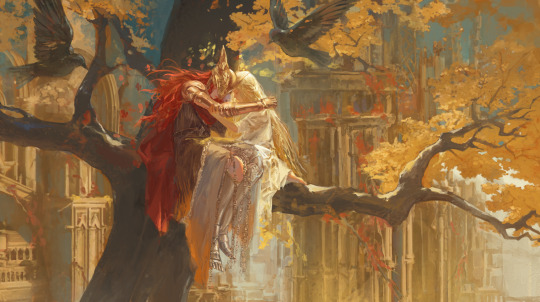Text
Mairon loved Tyelperinquar’s hands. Of all of his handsome features it was Tyelperinquar’s hands that Mairon most adored, and kept in memory how they felt on his bare warm flesh during passionate nights.
In fact, Mairon loved them so much he kept them, hewing both of them at the wrist and casting them in pure mithril. Fixed to his favorite shawl Mairon often stroked the cold metal of his fingers in thought, Tyelperinquar’s hands forever upon his shoulders… supportingly… lovingly.
Who said names were not always a prophecy.
490 notes
·
View notes
Text
Rewatching Lord of the rings after reading the Silmarillion is so weird because before I always pictured sauron as like Ultimate Bad Guy, always wears that armor, when he’s not sitting menacingly on his throne he’s kicking puppies and making orcs. But now I just sort of picture him as Arda’s Main Twink™, thinks he’s way too pretty to wear that armor except when he wants to intimidate people, he spends all his time torturing people and making fancy jewelery and when he actually sits on his throne he sits like a whore but like… a tasteful whore.
1K notes
·
View notes
Text

“ Even if she was left behind, I doubt her heart would waver ”
1K notes
·
View notes
Text

"I promise you. A thousand-year voyage guided by compassion."
"Lord of the old order. Let us go together."
"Let your thoughts be only of love."
2K notes
·
View notes
Text
Shadow of the Erdtree: Some Reflections
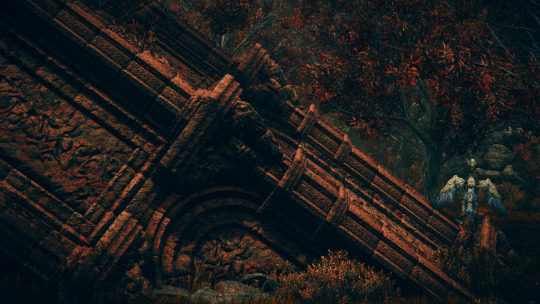

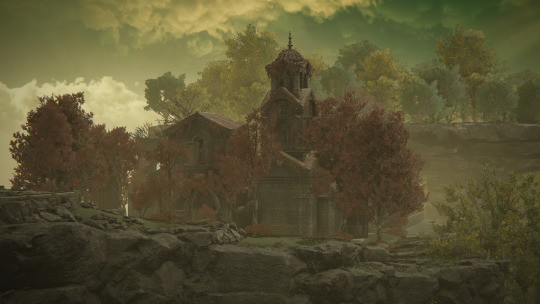
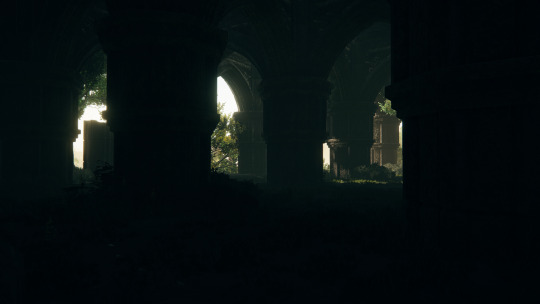
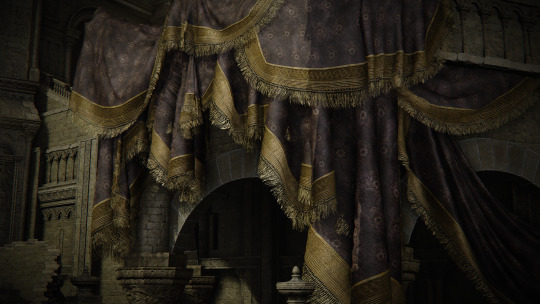
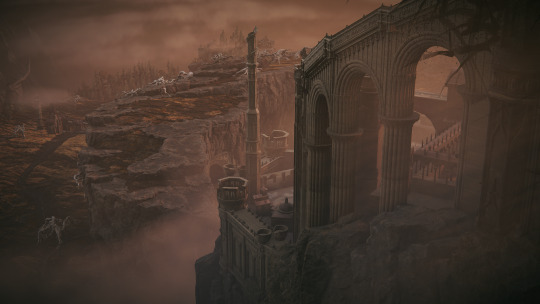
Well, folks, since no one asked, here are some thoughts I've had while exploring Elden Ring's add-on, Shadow of the Erdtree.
The existence of an alternate shadow realm has solidified my conviction that what Elden Ring is depicting on micro and macro scales is the phenomenology of etheric bodies -- extending even to the moon, the double of which is visible from the Moonlight Altar plateau (this is reflected by Rellana's Twin Moons spell). Each of these bodies possess a regulating function. Although each might be generally described as doppelgänger, the occult scientist Rudolf Steiner wrote of the Doppelgänger proper as its own sort of body, responsible for the tension between aspiration and temptation. It's interesting to me that this is such a major preoccupation of the game, because it indicates a layer of esoteric involvement, on the part of Elden Ring's narrative conceptualizations, that I don't think anyone in the so-called lore community has picked up on yet. The shadow realm helps explicate the otherwise inexplicable Godefroy the Grafted, too.
Various details have also strengthened my impression that the revolt against Nature we see in Elden Ring is a revolt against motility -- motility being the ultimate enemy of utopia: a human conceptualization reliant upon infinite stasis. In the base game, I think we see this revolt most profoundly in the narrative of Ranni, who first abandons her own flesh and then strives towards the realization of an Age of Stars, that "thousand year voyage under the wisdom of the Moon." Although the Seedbed Curse represents its own revolt against Nature, it remains within the organic order. Ranni's vision is of the inorganic and remote. And I don't think it's unrelated that, in certain esoteric cosmological systems, the moon stands as most distant from the Absolute.
The colors of the landscapes and sky are amazing: vivid, autumnal, and strange. These palettes have only made me dislike the game's rain effect all the more, which does not deepen the arboreal colors (as it should) but drains all surfaces of color and sets them into a depressing, bland grayscale. To say that the rain is a part of why I consider Raya Lucaria to be Elden Ring's low-point in the realm of major level design could be seen as a trivial complaint, but visual drudgery will wreck even the best schemes; and Raya Lucaria is as far as you can get from that anyway. FromSoftware has done fine with types of snow (see, e.g., the Frigid Outskirts or Painted World of Ariandel), but I think they've yet to figure out rain, among some other graphical technicalities.
The forges are among my favorite instances of discrete level design, even if, or maybe because, they tend to contain only two or three enemy types, feature no bosses, and severely scale back the level of challenge. I happened upon one yesterday that I did find a little dull, but the other two were wonderful, brief, atmospheric knots, quiet sequences of colossal architecture, that sort of evoked shades of Stonefang Tunnel from Demon's Souls. On that note, I'd call special attention to the forges' theme music. The only other piece of music from the DLC that's gotten my attention is the theme for Belurat.
Plants are People, Too.
Torrent is just... a terrible inclusion for this game. It's maybe obvious enough to not warrant being said, but -- any design decision has to be evaluated on what it contributes to the system it's been set into, and Torrent adds nothing outside of the occasional, brainless convenience. I could maybe see an argument for Torrent's presence if he had some emotionally charged narrative integration, maybe like what Shadow of the Colossus did. Without this, Torrent is nothing but a tool which perpetually problematizes the overworld's scale (a bit too big, yet no fun to traverse at high speed) and trivializes all of its gauntlets on a potential and actual level far worse than anything the Spirit Ashes could ever do. Better to me would've been if the only way to use a mount were by defeating a mounted knight without killing their horse and then sneaking up to the runaway to gain ownership of it.
I'm finding the map much more engaging than that of the base game because of how it plays with abstractions and builds anticipation through that. One part of the map, for instance, shows a bunch of trees with red leaves. Reaching this place reveals these "trees" to be enormous red flowers. Another section shows pink, purple, and orange specks. What are these? And what are the gray, finger-like lumps erupting from the mass next to it? I've also found it tough to figure out how to progress from one plane to another because of how densely stacked and knobby the continent's features are, so consulting the map has been helpful in a way I rarely experienced with the base game's.
Love how much the Ancient Ruins of Rauh resemble The Elder Scrolls IV: Oblivion, from the explosion of verdure, to the crude, architectural naivety defining the pseudo-Gothic structures.
With Shadow of the Erdtree, I keep coming up against an unresolvable simultaneity like the one mentioned above regarding the overworld. There's a lot of good level design to be found here among the dungeons, castles, and forts, yet the abundance and enormity of it all seems to have deprived the game of significant contrasts, and those special spatial moments, which I found much easier to locate and reflect upon with, say, Dark Souls or Bloodborne. Sure, the sky-piercing spiral of Enir-Ilim is a sight to behold; but soon enough the sequences of grand staircase upon grand staircase, great bridge upon great bridge, creates a perpetual climatic grandiosity that diminishes the very effect of a climax (and I'm not even sure that Enir-Ilim is the DLC's intended final location). Anor Londo or the Nightmare of Mensis could feel special because the qualities and features of their spaces stood apart from everything else. Elden Ring, I think, has gotten itself into a predicament by trying to one-up its internal material and all prior FromSoftware games through the enormity of its scale -- and challenge. More and more, I've been craving a new project from them that resets these terms of engagement, even while enjoying the consistency of the material at hand.
That's all for now! In time maybe I'll turn these thoughts to an essay for my Substack page, perhaps with a focus on the first two points.
23 notes
·
View notes
Text
(adapted from my reply to x)
My headcanon for the final cutscene of the DLC is that Miquella saw what the rite of divinity entailed (cutting away both his arms, his flesh, his fate, his strength, his love) and was reasonably scared. As in, he didn't want to do these things, but he felt compelled to, because he had an atlas complex. He saw within himself the potential to "save the world", and so he felt personally responsible to do it.
This is a scared child/man (depending on your interpretation of his psychological age) afraid of having to cut away pieces of themselves, but not wanting to disappoint his older brother. The same demigod who watered the Haligtree with his own blood to help those abandoned by everyone else.
Even when he started the ritual, up until a certain point, he still had his doubts and hesitation. That, he had to discard too at some point. Trina tells us what he wanted to tell others but couldn't: please help me, I'm scared.
81 notes
·
View notes
Text
Official version of the final cutscene:
Lord brother.
I'm going to be a god.
If we honour our part of the vow,
promise me you'll be my consort.
I'll make the world a gentler place.
Unlike the Remembrance, the content of the Japanese text isn't significantly different this time, but the tone has again been stripped out. My translation:
Nii-sama
I'll definitely - definitely become a god,
so - so if we honor our part of the vow,
please become my king.
…I just… want to make the world kind.
Explanation:
兄様
Nii-sama
When Miquella says "Lord Brother," this is always what they're saying. It's also what Malenia calls Miquella when she apologizes for losing.*
私は必ず、神になります
I'll definitely - definitely become a god,
The comma is there to show hesitation, and the "definitely" ("kanarazu" / 必ず) is defensive: Miquella is defending their ability and/or willingness to become a god. With the sentence structure of a panicking child promising an angry parent they'll clean up after the puppy.
ですから、私たちが約束を守れたら
So - so if we honor our part of the vow,
Again, the comma's there to show hesitation or stuttering. The connective "so" ("desu kara"/ですから) is characteristic of a nervous person trying to bargain.
(There's no indication of who else or how many people "we" includes.)
私の王になってください
please become my king.
They don't say "promise" - too aggressive.
…世界を、優しくしたいのです
…I just... want to make the world kind.
They do not say "kinder", and they do not say "will": this isn't a promise, but a justification. As with everything else here, it sounds hesitant and conciliatory.**
The implication of this scene - the defensiveness, the promises, the honorific language, and the fact that Miquella is kneeling - is that Miquella has been apologizing to Radahn for some failure. Most likely, Radahn accused Miquella of being unable or unwilling to become a god, and so of failing to hold up "their" half of the vow, and Miquella is trying to reassure him.
From an emotional standpoint, I think it's pretty obvious what this is supposed to tell us about Miquella's motivations.
"What did Radahn want from Miquella?" is the question being asked here. Freyja asked it at the beginning, and the final cut-scene asks it again, to remind us that we still don't know the answer.
And from a plot standpoint, it tells us this: Radahn's half of the bargain is "marry Miquella and so become Elden Lord". So - by definition - that cannot be what Radahn asked Miquella for.
And whatever Radahn's half is, he wants it first. And, apparently, Miquella provided it - immediately before the final battle, with assistance from Malenia and the Tarnished.
"Figure it out!" says FromSoft. "Tee-hee-hee."
---
* On losing, Malenia says:
"…Aa, nii-sama …Aa, nii-sama, nii-sama. I'm sorry… Malenia lost…"
Referring to yourself in the third person is basically baby talk. As with Miquella, a lot of Malenia's Japanese-language dialog sounds childish. There's currently no way to know for sure if she was always like that, or if it's part of her post-Caelid mental deterioration… but Millicent talks like an adult.
(Malenia is saying "nii-sama" in "My brother will keep his promise", too - but there, she seems to be half-asleep and mumbling, and can't remember the kanji for "sama".)
** The way Japanese verb endings work, it's easy to accidentally land on a "no desu" (のです) like Miquella does here when you blurt something out carelessly, start regretting it before you end the sentence, and want to make it more polite. In "professional Japanese" classes, you get a lot of reminders not to end sentences that way because it sounds "weak," "pitiful," or "like you're always apologizing."
194 notes
·
View notes
Text
Another criticism I see a lot about SOTE’s writing is that Miquella’s journey to Godhood makes no sense when compared to Ranni’s. I disagree.
The story of SOTE impresses upon us over and over that Miquella is discarding too much. He is discarding the wrong things. He is desperate and scared and he feels he can’t NOT be a God. So if Trina tries to dissuade him? Remove her. His love and his doubt and his fears are making him look back? Get rid of them. These aren’t malicious, devious choices but ones he has been made to feel are necessary.
Ranni also sacrificed. She gave up her body as Miquella did. But she also sacrificed Godwyn in her stead. One must assume Godwyn’s soul contained his love and doubt and fears. So Ranni and Miquella have made equivalent sacrifices. Ranni just used a proxy in her plans.
Lastly, Malenia was also shedding pieces of herself. It is implied that Millicent and her sisters are not really ‘daughters’ of Malenia in a traditional sense but pieces of her that gained form and sentience. Millicent’s whole quest ends with her realizing this truth and trying to return herself to Malenia. Plus, Malenia’s body was also literally rotting away.
The devastation of soul and body in Divine Ascension are themes shared by all 3 Empyreans very cohesively.
116 notes
·
View notes
Text
So it does seem to be a thing -- at least with certain demigods -- looking at you, Miquella and Rykard -- that to make one forget is an act of compassion.
The only difference is that Miquella doesn't give people that choice. Rykard, surprisingly, did.
4 notes
·
View notes
Text
I only got interested in Elden Ring after the DLC came out so I don't know what the fandom was like before, but I thought Miquella being morally questionable was actually a super interesting plot twist.
Not necessarily in that "good guy is actually bad guy," way, but in how it plays with the player's expectations. It really surprised me to learn how controversial it was.
Miquella in the base game is only truly selfless demi-god, with a dream of a world of kindness and equality. He represents the "perfect option"
One thing that Elden Ring shares with it's FROMSOFTWARE predecessors is that there are no perfect options.
In the basegame, this concept is carried out by having this "perfect option" unavailable to you. Miquella has been diminished by Mogh's mad actions, reducing him to a thin arm falling out of a strange cocoon.
It's part of the tragedy, That even if you wanted to fix everything, you cant.
The DLC furthers this concept, revealing that this perfect option never even existed to begin with.
26 notes
·
View notes
Text
Thinking about of all the things miquella abandoned, his love was the one he sealed away in the deepest, darkest pit he could find. Do you think he did that knowing that he, himself, would regret this? Do you think he buried it so deep so he could not go back and retrieve it? Do you think all of the sleeping animals were the last audience to kindly miquella's love. Do you think that's why they're arranged so methodically. Do you think he held them all and patted them with fondness one last time before his touch and his heart both would grow cold. Do you think he left them there for Trina, as close as they could be without succumbing to her poison or her protector. Do you think he chose a skeleton rider specifically because it was one who lived in death, his dear older brother's domain.
Do you think I need to take my medication today.
152 notes
·
View notes
Text
Miquella and Trina; A Tragedy
Hey Tumblr. I have a lot of thoughts about Shadow of the Erdtree, and these ones... let's just say I don't think they'd do well on Reddit.
It's not often that I feel particularly impacted by a particular fictional character. Usually I connect more with narrative arcs and themes, which is why I think I'm so drawn to the ephemeral, vibes based storytelling of Fromsoft's games. Playing through SOTE, though, I found Miquella (and St Trina) to be extremely emotionally compelling and relatable, and I wasn't sure exactly why. I think I've put my finger on it now though. First of all, know that I am writing from the perspective that Miquella is a sympathetic character. I know that it's not uncommon to read him as a manipulative Machiavellian villain, but I think that's both a misreading of the text as well as just plain boring. Like, he's not a Griffith clone you guys, give From some credit. Anyway, here we go.
"You have no understanding. Of Miquella the Kind. Of St. Trina's Love.
Content Warning: I'll be discussing themes of depression, and the implication of suicidal ideation.
So, a classic Fromsoftware theme is despair, and the ways we cope with a world full of it. It shows up twice in Shadow of the Erdtree; with Midra and the Frenzied Flame, where despair leads to a selfish nihilism that asks us to burn everything down, and with Thiollier and St Trina, who offer sleep as a comfort to the weary. Running a small errand for Thiollier has him say the following.
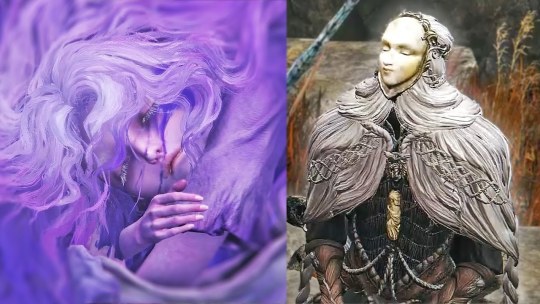
"If you find yourself… weary of the weight of this life, then just give me the word. Sleep is a balm, and eternal sleep… is an elixir."
Drinking the elixir he offers will, of course, result in an instant death. This is our first encounter with the idea of "Eternal Sleep," a more potent form of the sleep status effect that only appears here in the Shadowlands, after St Trina has been abandoned. The Velvet Sword of St. Trina tells us as much: "Silver sword of St. Trina, now stained the color of velvet. Inflicts eternal sleep. When St. Trina was abandoned, the faint, light-purple mists coalesced into an intoxicating deep-purple cloud."
In order to ascend to godhood, Miquella abandons first his physical body, and then the more abstract aspects of himself. As we begin to descend down the fissure where we'll find Trina, a cross marks the spot as the place where Miquella abandoned his love. This connects Trina, "the discarded half" as Thiollier puts it, with Miquella's love. Leda confirms this in her own dialogue:
"St. Trina's love for Kind Miquella is boundless. She is, after all, his other half. Or perhaps her feelings go beyond even that. Even if she was left behind, I doubt her heart would waver."
Keep that in mind, it'll be relevant later.
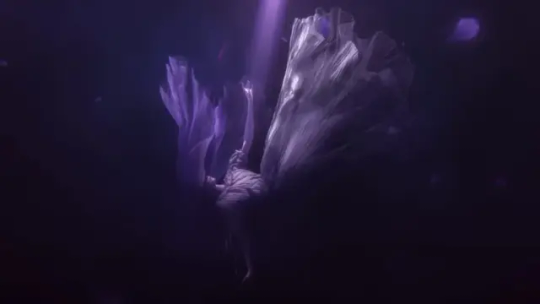
Near the cross, a spirit offers up some of the most heartbreaking dialogue I've come across so far. The spirit gives us a bigger picture of Miquella's goals:
"Kindly Miquella... I see you've thrown away... something you should not have. Under any circumstances. How will you salvation offer... to those who cannot be saved? When you could not even save your other self?"
I teared up at this. The emotional impacted was aided by the fact that I ran into the spirit right after telling Moore to put his past behind him, leading him to rededicate himself to Miquella. He says:
"Hm. Maybe that’s Kindly Miquella’s love. Love for all the unloved. Love, to banish the pain."
Note here that Moore suggest Miquella's love will "banish the pain." This is also essentially what Trina's sleep does. It's a comfort to those in need. Anyway, between these two instances, we end up with a pretty good picture of the sort of god Miquella wants to become. He was already sympathetic to the outcasts of The Lands Between in the basegame, where he built Elphael and the Haligtree as a haven for those rejected by the Golden Order, such as the Albinaurics and Misbegotten we find there. In the Shadowlands, he has gone a step further. Hornsent tells us that he has committed himself, in essence, to righting Marika's wrongs.
"Miquella has said as much himself – he wishes now to throw it all away. He says the act – though undoubtedly painful – will sear clean the Erdtree’s wanton sin. The truth of his claim can be found at each cross. 'Tis evidence enough to earn my belief."
Of all of Marika's children, Miquella is the only one to see the serious flaws in her empire. Ymir points this out to us as well.
"No matter our efforts, if the roots are rotten, then we have little recourse. Ever-Young Miquella saw things for what they were. He knew his bloodline was tainted, his roots mired in madness. A tragedy if there ever was one. That he would feel compelled to renounce everything when the blame lay squarely with the mother."
My thinking here is aligned with Mother Ymir. You really have to feel for Miquella; he has essentially taken on, alone, the responsibility of making up for centuries of Golden Order imperialism. That's a massive burden to bear, especially for Miquella, cursed with eternal childhood.
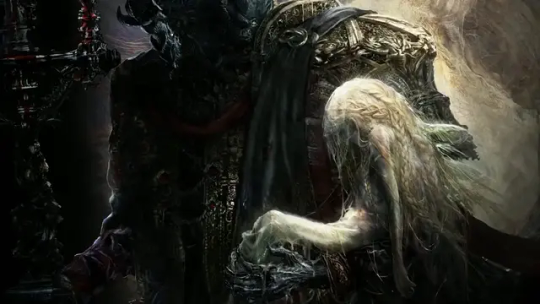
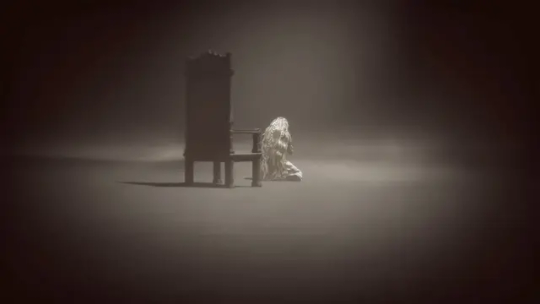
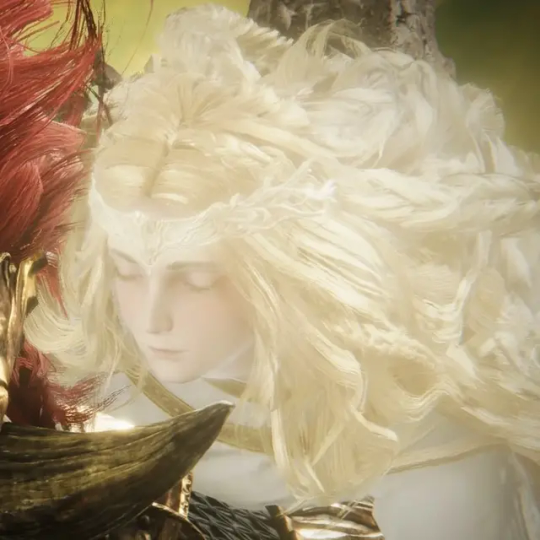
(It's easy to miss, but Miquella actually ages up significantly when we see him in god-form. Until he steps back through the Divine Gate, he would have looked and sounded like he does in the introductory art and in ending memory scene. Compare those with how he appears in the boss fight, and it's clear godhood at least helped him reach puberty lol)
So we've established that Miquella is the child of Imperial Rome on Steroids, is cursed with eternal childhood, and is an empathetic prodigy with the weight of the world on his shoulders. Surely his mental state is perfectly healthy, right? Right??
Final warning, this is where things get quite sad. Here is where I will try to tie Miquella's arc together with Thiollier and St Trina, and the comforting oblivion and relief from despair that sleep represents for them.
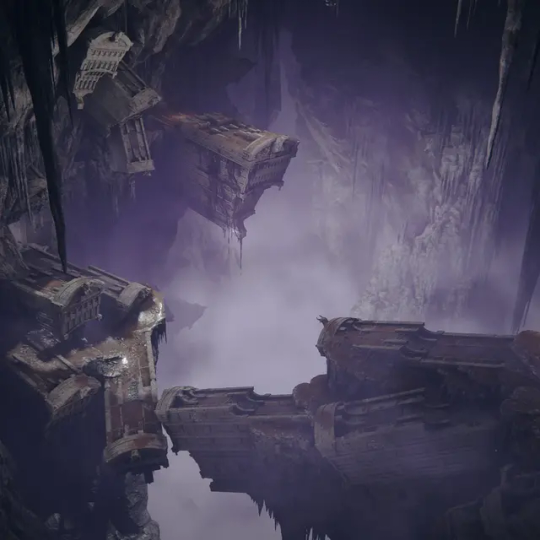
As we search for St Trina, we descend down into the Stone Coffin Fissure. This is a place of death, with massive coffins built into the fissure walls, and Gravebirds, Bloodfiends and Putrescent enemies everywhere. St Trina is found at the deepest possible pit of this fissure, in a swamp of putrescence that has since blossomed into a garden of deep velvet lilies because of her influence. Trina offers us nectar of "eternal sleep," as Thiollier did previously, and as established then, "eternal sleep" is essentially nothing more than a peaceful death. Trina seems to fit in quite well in this place of ancient dead things, with some of the ancient remains even being compelled to fight for her in exchange for eternal rest, becoming the Putrescent Knight.
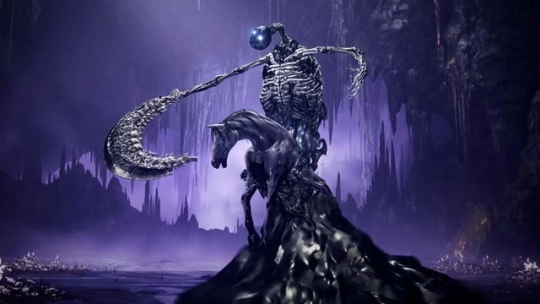
(Side note for levity because we're about to get sad again; I love this guy. It's a knight made out of the skeleton of a horse, riding on that same horse's decaying flesh goop body. Like, ugh. Beautiful. Plus, it may even have taken that shape because of Trina sharing Miquella's memories of Radahn, who was never far from his horse Leonard...)
We meet St Trina in her garden, and when we imbibe her nectar, we eventually begin to hear her voice in our death-dreams. She seems to pity him. Mourn for him, almost.
"Make Miquella stop... Don't turn the poor thing into a god..."
Trina appears to be in a bad state after her fall. She can only manage to get a few words across to us at once. Just as Leda predicted, her heart hasn't wavered. She is only concerned with Miquella's well-being.
"Godhood would be Miquella's prison. A caged divinity... is beyond saving."
Trina's most pressing concern is that godhood will be a prison for Miquella. Now, this could in theory be because gods are subject to manipulation from the Fingers and the Greater Will or a similar reason, but given that she calls him a "poor thing," I think there is likely a more emotional reason behind Trina's plea. I think that Trina is speaking as the embodiment of Miquella's love, but especially his ability to love and care for himself...
"You must kill Miquella... Grant him forgiveness."
...and she asks us to kill him.
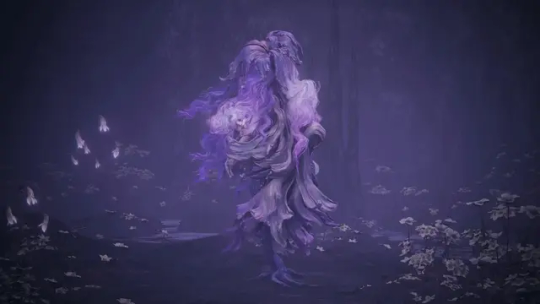
In excising Trina from his being, I think Miquella also expelled the part of himself that was able to recognize how miserable divinity would be for him, and how miserable he was. The part of him that was tired of carrying the responsibilities that his compassion demanded of him. The part of him that was exhausted, despairing and desperate from having failed to cure Malenia, failed to save Godwyn, failed to perfect the Haligtree. St Trina is the part of Miquella that wanted to be stopped, to rest, to sleep, to die. In abandoning her as he does, Miquella is essentially repressing those thoughts and feelings, replacing them with more "selfless" ones; self-sacrifice, suffering on behalf of others, his martyrdom and apotheosis. I don't want to forget about "grant him forgiveness" either. She might mean forgiveness for failing to become a god, for not being good enough to succeed Marika and right her wrings. Maybe forgiveness for failing Malenia and Godwyn, or for leaving the Haligtree behind. Maybe even for abandoning her. But on the road to godhood, Miquella can't afford to indulge in this sort of self-pity. A child craves forgiveness and approval, a god must cast these things out.
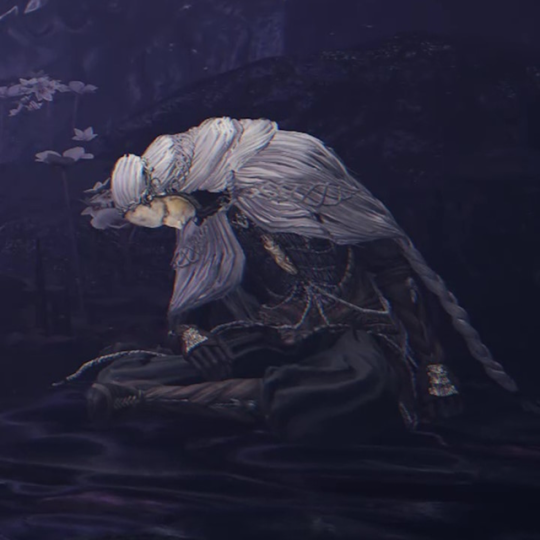
"I'm feeling rather lost. Haunted by memories. Of St. Trina. Her visage. Her scent. The lure of velvety sleep. Would Kindly Miquella chasten me? For falling for St. Trina, while knowing that she was the discarded half? The problem is… I simply cannot help it. I would sacrifice everything, just to gaze upon her, one last time."
I want to mention Thiollier one more time here too. His primary visual motif is the long white braids that he wears on his clothes, reminiscent of Miquella and Trina's own signature braids (remember, she looked like an older feminine Miquella before her fall and injury). Thiollier is obsessed with Trina, pursuing her to hear her voice and fade into the comfort of her velvet sleep, though this doesn't kill him like it does us. I don't think Thiollier is connected to Miquella in any textual way, but I think he does serve as a reflection of the sorts of thoughts Miquella may have been surpressing. The self-pity, the need for approval and love, the feelings of weakness and uselessness. These are the things that lead Thiollier to pursue endless slumber.
Thiollier doesn't give in to that despair, however. Though he initially takes St. Trina's words... poorly, he eventually realizes what must be done, and dedicates himself to his new purpose: carrying out her final wish.
"I am here to serve St. Trina evermore. I am deeply sorry. For doubting you. I am here only to grant St. Trina's singular wish. I will stop Miquella the kind. He will never become a god."
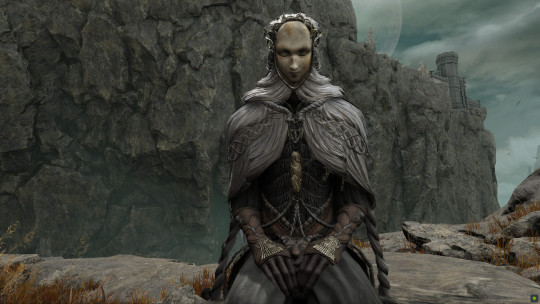
This post is already quite long, but I also want to mention the obvious gender stuff going on here. There are a number of moments that make it seem as though St. Trina might actually be more than just "half" of Miquella. Firstly, as she is shown falling in the story trailer, Leda is describing how Miquella abandoned his fate, as if Trina had a vital role to play in Miquella's future. It also seems as though Trina isn't cursed in the same way that Miquella is; her voice and size indicate that she is at least more substantial than his "infant form," and she is depicted in "adult form, somewhat unnervingly" on the Torch of St. Trina. Furthermore, her "adult form" has a third eye in the middle of her forehead. The third eye is a symbol of enlightenment in both Hinduism and Buddhism; it seems that Trina has achieved some level of wholeness in this depiction. Meanwhile, when Miquella achieves godhood, his eyes remain permanently shut. He also appears to have only one physical arm. He holds Radahn with two incorporeal arms while casting with his real right arm, but his left arm appears to fade away to nothing before the elbow, as if unfinished. Miquella's blindness and asymmetry here, I think, reflect how unbalanced and incomplete his divinity is without Trina.
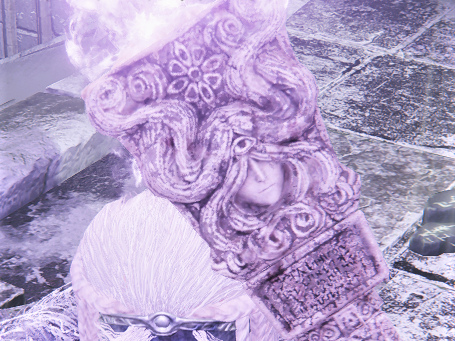
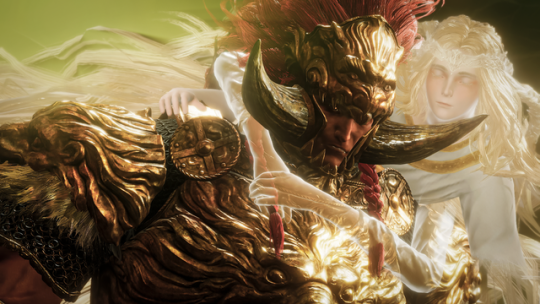
One more hint towards St Trina being a part of Miquella's future lies way back at the Haligtree. In Malenia's bossroom, just above where Miquella's cocoon was once embedded into the tree, the branches and roots appear to form a silhouette. This could be Miquella, Trina, or both, but I do see a certain resemblance to Trina's depiction on the torch in the way the "hair" covers the eyes. Given that Miquella's body appears to have grown a decent amount inside of the cocoon when we see in at Mohg's palace, it's possible that the cocoon situation was his original attempt to cure himself of his own curse, or perhaps become a part of the Haligtree itself. In the Shaman Village, Marika's home, there is a similar scene. A woman's body that resembles Marika seemingly mummified within the hollow of a tree. I honestly have no idea what to make of that just yet, but I thought it worth a mention.
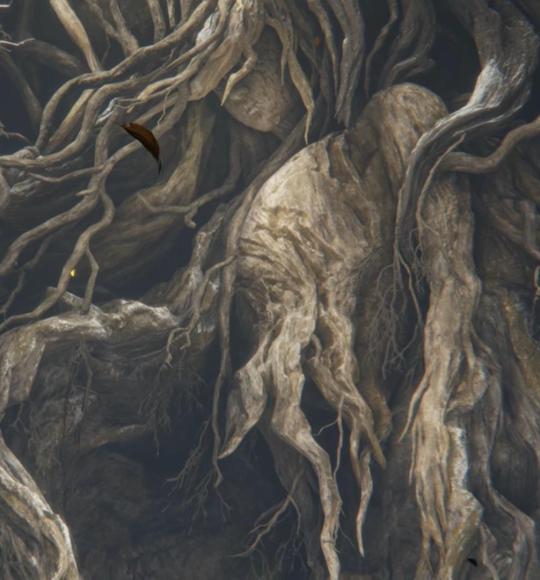
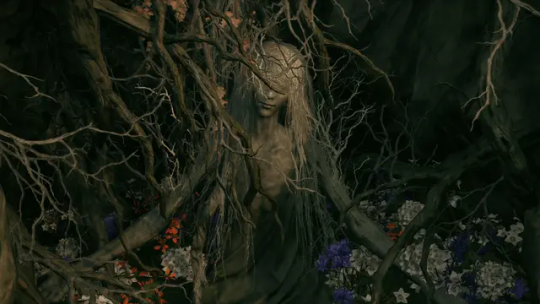
So, with all that in mind, abandoning Trina seems to be even more significant. Not only has Miquella divested himself of his love and his fate, but maybe even his future, too. Being eternally nascent, he is always in a state of potential, after all.
Am I suggesting that Miquella is a transfeminine character? That he was meant to grow up to become a goddess in the aspect of St. Trina, or maybe even more like Marika than he already is? Well, maybe. If you find it compelling, then absolutely. Fromsoftware's storytelling is always ambiguous, and is always design to leave us some room to read and interpret, to really play in the space we are given. Personally, I do find it compelling in a horribly tragic sort of way, fitting for the setting. It's also entirely possible that I have rather self-indulgently projected some of my own angst onto these character. I likely have, to be perfectly honest. It's rare that I really connect with a set of characters or a story like I have with this lot, and I hope that maybe some of you reading this will feel similarly. If you have read this far, thanks <3
546 notes
·
View notes
Text
If you think Miquella wasn't absolutely destroyed by the idea of abandoning St Trina then you're wrong.
"I abandon here my doubts and vacillations."
Miquella was definitely having a mental breakdown before he decided to cast aside his doubts, most likely to make this decision easier and to give him some backbone to see through what needed to be done to bring about a gentle world. He loves her just as much as she loves him, and when he became a God would he have returned to Trina just as he promised to return to Malenia?
I believe he would have.
"I abandon here my fears."
Miquella was absolutely terrified this entire ordeal, and it's fascinating that his fears were the very last thing that he would abandon. Why would he hold onto something that gave him such anxiety and anguish? I honestly think the Hornsent said it best:
"Though undoubtedly painful, Miquella believes that this action will cleanse the Erdtree of its sin."
It wouldn't surprise me if Miquella clung to his fears so fervently because he believed it to be a form of self-punishment that he was deserving of, both to repent for the actions of the Erdtree and his own....
Ultimately he made his choice, even though it literally ripped his heart out :(
108 notes
·
View notes


